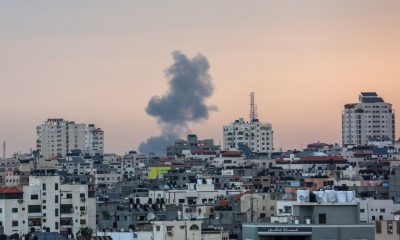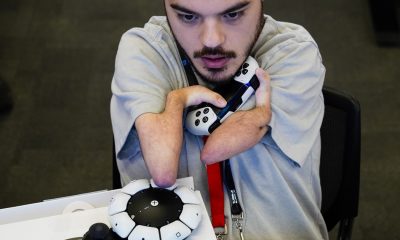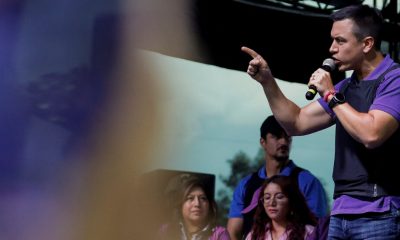Top News
FIFA Will Host 2030 World Cup on Three Continents

Soccer’s World Cup will be staged in six countries on three continents in its centenary edition in 2030, an unexpected and complex alteration to its traditional format that was approved on Wednesday in a meeting of FIFA’s governing council.
In the unusual arrangement, three South American countries — Argentina, Paraguay and Uruguay — each will host a single opening match on home soil and then join the rest of the field for the remainder of the tournament, which will take place in Spain, Portugal and Morocco.
The six countries had initially joined forces regionally in separate bids for the hosting rights to the 100th anniversary World Cup, a globe-stopping, monthlong soccer festival that produces billions of dollars in revenue for FIFA every four years.
The offer from the South American nations had long been considered an outsider, however, to the three-nation bid from Spain, Portugal and Morocco, which was officially declared the sole bidder for 2030 on Wednesday. But under the new arrangement to recognize the tournament’s centenary, each nation will get to take a turn as a host.
“In 2030, the FIFA World Cup will unite three continents and six countries, inviting the entire world to join in the celebration of the beautiful game, the centenary and the FIFA World Cup itself,” FIFA said in a statement after the meeting.
“The FIFA Council unanimously agreed that the sole candidacy will be the combined bid of Morocco, Portugal, and Spain, which will host the event in 2030 and qualify automatically.”
In sharing the 2030 tournament among three continents, FIFA also significantly narrowed the field of nations eligible to bid for the 2034 event. That opened the door for Saudi Arabia, a nation that has made no secret of wanting to host, to win the rights when that host is selected next year.
The first World Cup was held in 1930 in Uruguay, when the championship was a compact, 13-team affair held over two-and-a-half weeks in a single city, the Uruguayan capital, Montevideo. It has since grown to be one of the most valuable and most watched sporting events in the world, a financial juggernaut that FIFA projects will produce record revenues of at least $11 billion for its current four-year cycle, almost double what it earned in the last one.
The complexity and size of the World Cup has grown steadily in recent decades, with the next edition — in 2026 — expanded by 12 teams to 48 in total, making it the largest in history. That size, and FIFA’s exacting requirements for bidding countries and stadiums, mean that few nations are now capable of staging the event alone.
The 2026 tournament will take place mostly in the United States, but games also will be staged in Mexico and Canada — the first time the tournament will be played in three countries. The complexities of holding that event have yet to be worked out, and officials are still grappling with a wide range of complications, ranging from visa-free travel for spectators to taxation.
Speculation that FIFA was preparing to make a surprise announcement was tipped by the South American soccer head Alejandro Dominguez, a FIFA vice president, who took to social media as the meeting was taking place to post a video of himself dancing, suggesting in Spanish “something global is coming for all football fans.”
Dominguez then broke the news in a post on X, the platform formerly known as Twitter, before FIFA had a chance to make its announcement.
“We believed in big,” Dominguez wrote in Spanish. “The 2030 Centennial World Cup begins where it all began.”
Taking the tournament to all six countries allows FIFA and its president, Gianni Infantino, to avert some difficult political choices, and could allow Infantino to deliver the next tournament to a reliable ally. In FIFA’s statement announcing the plans for 2030, it said that only teams from Asia and Oceania could bid in 2034 — creating an opportunity for one of his closest backers, Saudi Arabia, to secure a tournament, and a global stage, that it covets.
Within an hour of FIFA’s announcement, the Saudi press agency had published a statement from the kingdom’s powerful crown prince, Mohammed bin Salman, expressing his country’s interest in hosting in 2034, and the president of the Asian soccer confederation had thrown his support behind the effort, declaring “the entire Asian football family will stand united in support of the Kingdom of Saudi Arabia’s momentous initiative.”
FIFA said that bidding for the 2034 World Cup would conclude with a vote at a meeting of its 211 member nations next year, short-circuiting a process that had been expected to conclude in 2027 or 2028. The shorter timeline reduces the time for other nations considering bidding for the tournament to put together coherent plans.
Infantino, elected to FIFA’s top position in 2016, will now have the chance to leave his imprint on least two more World Cups, include the 2034 event, which will take place after his final term in office is supposed to have ended.
His legacy already includes major changes to the World Cup, with 48 teams, resulting in a change in the competition’s format, as well as clearing the way for more than two countries to co-host. Infantino had wanted to stage the World Cup biennially, but that effort ended amid bitter opposition from European soccer officials as well as top clubs and fans.
Fans groups were quick to oppose the plans for the multicontinent 2030 World Cup on Wednesday.
“FIFA continues its cycle of destruction against the greatest tournament on earth,” one umbrella group called Football Supporters Europe posted on X. “Horrendous for supporters, disregards the environment and rolls the red carpet out to a host for 2034 with an appalling human rights record. It’s the end of the World Cup as we know it.”
The 2030 championship will now start with an opening ceremony at the Estadio Centenario in Uruguay, the site of the 1930 final, and stadiums in Buenos Aires and Asunción, Paraguay.
The three nations and their opponents would have to travel to Spain, Portugal or Morocco to continue with the rest of the tournament.
Top News
Putin in China: Xi Jinping welcomes Russian President

BEIJING (AP) — China’s leader Xi Jinping welcomed Russia’s President Vladimir Putin on Thursday as he began a two-day state visit while Moscow presses forward with a new offensive in Ukraine.
Putin arrived in Beijing by plane at dawn before his motorcade pulled in front of the Great Hall of the People in Tiananmen Square. Members of the People’s Liberation Army stood at attention while artillery fired a multi-gun salute.
Xi warmly greeted Putin as the shook hands at the bottom of the entrance to the classically designed building before they entered to hold talks.
Their meetings were expected to emphasize their commitment to the “no limits” relationship they signed in 2022, just before Russia launched its full-scale invasion of Ukraine. Since then, Russia has become increasingly economically dependent on China as Western sanctions cut its access to much of the international trading system.
On the eve of the visit, Putin said in an interview with Chinese media that the Kremlin is prepared to negotiate over the conflict in Ukraine. “We are open to a dialogue on Ukraine, but such negotiations must take into account the interests of all countries involved in the conflict, including ours,” Putin was quoted as saying by the official Xinhua News Agency.
The Russian leader’s two-day trip comes as his country’s forces have pressed an offensive in northeastern Ukraine’s Kharkiv region that began last week in the most significant border incursion since the full-scale invasion began, forcing almost 8,000 people to flee their homes.
Along with Moscow’s efforts to build on its gains in the nearby Donetsk region, the 2-year-old war has entered a critical stage for Ukraine’s depleted military that is awaiting new supplies of anti-aircraft missiles and artillery shells from the United States.
“We have never refused to negotiate,” Putin was quoted as saying by Xinhua. “We are seeking a comprehensive, sustainable and just settlement of this conflict through peaceful means. We are open to a dialogue on Ukraine, but such negotiations must take into account the interests of all countries involved in the conflict, including ours.”
Ukrainian President Volodymyr Zelenskyy has said any negotiations must include a restoration of Ukraine’s territorial integrity, the withdrawal of Russian troops, the release of all prisoners, a tribunal for those responsible for the aggression, and security guarantees for Ukraine.
China claims to take a neutral position in the conflict, but has backed Moscow’s contentions that Russia was provoked into attacking Ukraine by the West, despite Putin’s public avowals of his desire to restore Russia’s century-old borders as the reason for his assault.
Putin has blamed the West for the failure of negotiations in the opening weeks of the war and praised China’s peace plan for Ukraine that would allow Moscow to cement its territorial gains.
“Beijing proposes practicable and constructive steps to achieve peace by refraining from pursuing vested interests and constant escalation of tensions, minimizing the negative impact of the conflict on the global economy,” he had said.
Putin said a Chinese proposal in 2023, which Ukraine and the West rejected, could “lay the groundwork for a political and diplomatic process that would take into account Russia’s security concerns and contribute to achieving a long-term and sustainable peace.”
The Kremlin said in a statement that during their talks this week, Putin and Chinese leader Xi Jinping will “have a detailed discussion on the entire range of issues related to the comprehensive partnership and strategic cooperation and determine the new directions for further development of cooperation between Russia and China and also have a detailed exchange of opinions on the most acute international and regional issues.”
Putin began a fifth term in office this month.
Speaking Tuesday in the upper house of Russian parliament, Foreign Minister Sergey Lavrov said Moscow and Beijing are “objectively interested in maintaining our lead in efforts to establish a more fair and democratic world order.”
“Russia and China aren’t alone in their efforts to reform an international system and help establish a multipolar global order,” he said.
Lavrov noted that the “duet of Moscow and Beijing plays a major balancing role in global affairs,” adding that “the Russian president’s forthcoming visit to (China) will strengthen our joint work.”
Moscow has forged increasingly close ties with Beijing as the war has dragged into a third year, diverting the bulk of its energy exports to China and relying on Chinese companies for importing high-tech components for Russian military industries to circumvent Western sanctions.
The Russia-China military ties have also strengthened. They have held a series of joint war games in recent years, including naval drills and patrols by long-range bombers over the Sea of Japan and the East China Sea. Russian and Chinese ground forces also have deployed to the other country’s territory for joint drills.
China remains a major market for Russian military, while also massively expanding its domestic defensive industries, including building aircraft carriers and nuclear submarines.
Putin has previously said that Russia has been sharing highly sensitive military technologies with China that helped significantly bolster its defense capability. In October 2019, he mentioned that Russia was helping China to develop an early warning system to spot ballistic missile launches — a system involving ground-based radar and satellites that only Russia and the U.S. possessed.
___
Bodeen reported from Taipei.
Top News
Blinken’s Kyiv song choice raises eyebrows as Ukraine fights fierce Russian attacks

KYIV, Ukraine (AP) — Fresh from a day of delivering optimistic prognoses about how Ukraine would fare in the war with Russia despite gloomy news from the front lines, U.S. Secretary of State and amateur musician Antony Blinken may have thought he had the perfect upbeat song to perform with a Kyiv bar band on his fourth visit to the capital since the conflict began in 2022.
“I know this is a really, really difficult time,” Blinken told a packed crowd in the subterranean club Barman Dictat on Tuesday night.
“Your soldiers, your citizens, particularly in the northeast in Kharkiv, are suffering tremendously,” he said. “But they need to know, you need to know, the United States is with you, so much of the world is with you. And they’re fighting not just for a free Ukraine but for the free world, and the free world is with you, too.”
With those words and strumming a red guitar, Blinken and the local group 19.99 launched into Neil Young’s hit “Rockin’ in the Free World,” ostensibly to encourage Ukrainians to keep up the fight against Russia and hold to their Western aspirations, despite numerous battlefield setbacks that led President Volodymyr Zelenskyy a day later to cancel all his upcoming foreign trips.
With its refrain “Keep on rockin’ in the free world,” Young’s 1989 song sounds like it should be an homage to the glory of living in the West, uncompromised by communism or authoritarianism. In fact, as numerous social media critics noted, the tune is a lament about despair and misery caused by homelessness, drug addiction and poverty in the celebrated free world.
A charitable interpretation might be that Blinken chose to perform the song to underscore the importance of overcoming adversity by sticking to ones’ dreams of peace and freedom. After all, that had been the general theme of his remarks at events in Kyiv since his nearly pre-dawn arrival after an overnight train trip from Poland and it would continue to be on Wednesday.
“I’ve come to Ukraine with a message: You are not alone,” Blinken had told an audience of students and educators at the Kyiv Polytechnic Institute shortly before taking to Barman Dictat’s basement stage.
“Never bet against Ukraine,” he said at a Wednesday news conference with Ukrainian Foreign Minister Dmytro Kuleba.
But as Blinken sang the “keep on rockin’ in the free world” chorus, which is repeated 12 times in the 4-minute 40-second song, Russian troops were advancing near and around Kharkiv, Ukraine’s second-largest city, and Zelenskyy was in the process of deciding to put off a planned trip to Spain and Portugal later this week to deal with the crisis.
Thus, any intended musical encouragement — in both content and venue — left at least some observers scratching their heads.
Kyiv-based analyst Oleksandr Kraiev, director of the North America program at the Ukrainian Prism think tank, said Blinken’s visit was welcome but pointed out that he and many Ukrainians were puzzled by his two-day stay, including his stop at Barman Dictat, which was seen as inappropriate by some, given the current fraught wartime climate.
“From my point of view, and generally speaking from the point of view of common Ukrainians, it was not a very appropriate sign to go to the bar to have a small song with our band,” he said, noting that Ukrainian military recruitment officers are known to go to bars and nightclubs to check documents and catch draft dodgers.
“So (for the) secretary of state of the United States also to go to a bar, to have a small concert for people who are blamed for not enlisting in the Ukrainian army,” Kraiev said, “it’s not, let’s say, a catastrophe, it’s not a faux pas, but it’s something that is not very desirable from the point of view of common Ukrainians.”
U.S. officials with Blinken shrugged at the online criticism the secretary was receiving about his song choice and decision to sing at a bar. They also said he wouldn’t have done the event if he had thought it was inappropriate.
More broadly, the possible disconnect between the week’s battlefield developments and Blinken’s optimism was reflected in his activities and the size of his delegation.
Unlike on all of his three previous wartime trips to Kyiv, Blinken brought a full complement of staff and press with him. And while security was tight, he spent a good deal of time away from meetings with government officials, engaging with university students, civic leaders, local businesspeople and, of course, bar-goers. And, unlike on all of his previous visits except his last visit in September, he chose to spend the night in the city.
Yet, it may be “Rockin’ in the Free World,” its chorus and opening stanza — “There’s colors on the street; Red, white and blue; People shufflin’ their feet; People sleepin’ in their shoes; But there’s a warnin’ sign; on the road ahead; There’s a lot of people sayin’; we’d be better off dead.” — that the visit is remembered for.
As the band hit the opening notes, Blinken commented wryly: “I don’t know if we can pull this off.” And, then, according to the official State Department transcript: “(Music was played.)”
___
Samya Kullab contributed.
Top News
A timeline of territorial shifts in Ukraine war

Russian troops have launched a ground offensive along the northeastern border with Ukraine, opening a new front in the two-year war while pushing deeper in the country’s east.
Source link
-

 Tech7 months ago
Tech7 months agoBehind the Closing of Shen Beauty, a Brooklyn Boutique
-

 Tech7 months ago
Tech7 months agoHamas Seeds Violent Videos of Israel Attack on X and Telegram
-

 Top News7 months ago
Top News7 months agoACT test scores for US students drop to new 30-year low
-

 Top News7 months ago
Top News7 months agoSony’s Access controller for the PlayStation aims to make gaming easier for people with disabilities
-

 Business7 months ago
Business7 months agoExxon Acquires Pioneer Natural Resources for $60 Billion
-

 Tech7 months ago
Tech7 months agoA Stairway to Nowhere Sells for $32,000 in London
-

 Top News7 months ago
Top News7 months agoIs Daniel Noboa the Answer to Ecuador’s Need for Change?
-

 Sports7 months ago
Sports7 months agoNew doc is ’emotional rollercoaster’ for Beckham



